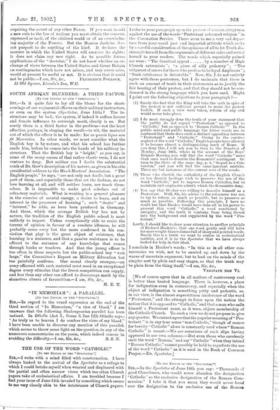SOUTH AFRIQAN BLUNDERS: A THIRD FACTOR. go TIER EDITOR OF
TIER ''SPRCTATOIL") SIR,—Is it quite fair to lay all the blame for the short- comings of our regimental officers on their military instructors, or even on the system (Spectator, June 14th) ? The in- structors may be bad; the system, if indeed it suffers favour and female influence to outweigh merit, clearly is so. But surely there is a third factor in the problem—not the least effective, perhaps; in shaping the result—to wit, the material out of which the officer is to be made : for ex quovis ligno non fit Mercurius. In other words, we must consider what the English boy is by nature, and what his school has further made him, before he comes into the hands of his military in- structors. That the British boy is "bright," as you say, in some of the many senses of that rather elastic term, I do not venture to deny. But neither can I doubt the substantial truth of Dr. Gow's description of his nature, as given in his able presidential address to the Head-Masters' Association. "The English people," he says, "are not only not docile, but a great. part of them, and especially those that set the fashion, do not love learning at all, and will neither learn, nor teach them- selves. It is impossible to make good scholars out of refractory materials. What is wanting is a general pleasure in the exercise of mental energy, a desire to learn, and an interest in the processes of learning" ; such " desire " and "interest," he adds, as have been produced in Germany. And these, which the average British boy has not by nature, the tradition of the English public school is most unlikely to impart. Unless exceptionally able to resist the torrent of opinion in favour of a resolute idleness, he will probably come away but the more confirmed in his con- viction that play is the great object of existence, that learning is a nuisance, and that a passive resistance is to be offered to the entrance of any knowledge that comes through books or teachers. And that the young officer is too often in these respects but the public-school boy "writ large," the Committee's Report on Military Education but too painfully confirms. One moral clearly emerges,—an army officered with such material must need in an exceptional degree every stimulus that the freest competition can supply, and less than any other can afford to discourage merit by the shameless abuses of favouritism.--I am, Sir, (ie.,
H. E. T.






































 Previous page
Previous page